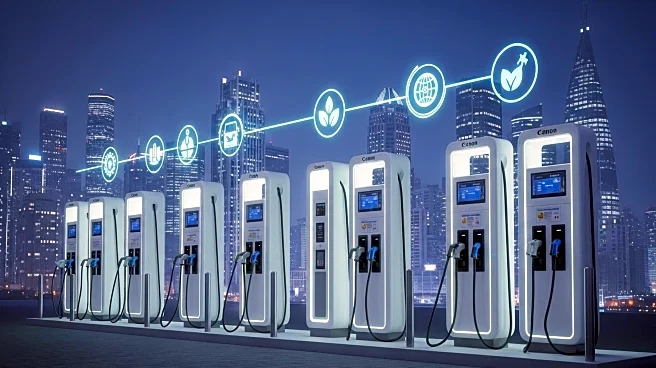What's Happening?
Ram has announced the cancellation of its first fully electric pickup, initially planned for release in 2027. The decision, revealed in a statement on September 12, is attributed to a slowdown in demand for battery-powered vehicles. This move marks a significant shift in strategy for Ram, as the company now plans to focus on V-8 performance vehicles. Antonio Filosa, who took charge of the automaker in June, is leading this strategic pivot. The Ramcharger, previously intended as an all-electric model, will be renamed and repurposed under this new direction. This decision reflects broader industry trends where automakers are reassessing their electric vehicle strategies in response to fluctuating market demands.
Why It's Important?
The cancellation of Ram's all-electric pickup highlights the challenges faced by automakers in the evolving electric vehicle market. As demand for battery-powered vehicles slows, companies like Ram are reevaluating their product lines to align with consumer preferences and market conditions. This shift could impact the broader automotive industry, influencing other manufacturers to reconsider their electric vehicle strategies. The focus on V-8 performance vehicles suggests a potential resurgence in traditional combustion engines, which may affect environmental policies and emissions targets. Stakeholders in the electric vehicle sector, including suppliers and investors, may face uncertainty as companies adjust their plans.
What's Next?
Ram's decision to cancel its all-electric pickup and focus on V-8 performance vehicles may prompt other automakers to reassess their electric vehicle strategies. Industry leaders and policymakers will likely monitor these developments closely, as they could influence future regulations and incentives for electric vehicles. Ram's strategic pivot may also lead to increased competition in the performance vehicle market, potentially driving innovation and new product offerings. As the automotive industry navigates these changes, stakeholders will need to adapt to shifting consumer preferences and market dynamics.
Beyond the Headlines
The shift away from electric vehicles by Ram raises questions about the long-term sustainability of the automotive industry. As companies balance consumer demand with environmental responsibilities, ethical considerations regarding emissions and climate impact may come to the forefront. This development could spark debates on the role of traditional combustion engines in a world increasingly focused on reducing carbon footprints. Additionally, the decision may influence cultural perceptions of electric vehicles, potentially affecting public acceptance and adoption rates.










